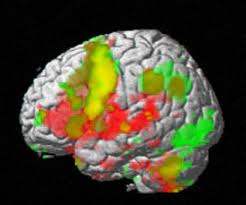摘要:人们容易在组成群组的情况时追忆过去,比如在家庭晚餐时,在重聚时或在其它的社交活动中;而在这种回忆的过程中人们可影响彼此的记忆。
一项新的研究帮助解释了这一过程是如何在脑中进行的。 Micah Edelson及其同事向志愿者放映一部纪录片,接着他们对这些人进行提问,并同时用功能性核磁共振成像(fMRI)来监测他们的脑部活动。 研究人员还与这些志愿者分享了一些不正确的答案,并告诉他们这些答案是与他们一同看电影的其他人给出的。有很大数目的参与者持续地赞同该错误的记忆,即使当他们原先的回忆是正确的(在前一个测验中显示了的)。当志愿者在最初看电影之后很久犯下这些错误时,fMRI的结果通常会显示其海马回和杏仁核中的活动增强。这些错误的持续存在表明,这些测试的受试者认为他们所记忆的是正确的。相反,当这些志愿者在被告知虚假的记忆时就犯这些错误时,这些大脑的活动模式没有在这一短期情况中出现。这些错误可能代表了一种为了顺从而改变一个人答案的更有意识的决定。
一则《观点栏目》指出,这一研究展示了一个从前未被认识的杏仁核的功能,尽管对这一发现的充分理解还有待未来的研究。(生物探索)

功能性核磁共振成像(fMRI)来监测他们的脑部活动
生物探索推荐英文论文摘要:
Science 1 July 2011:
Vol. 333 no. 6038 pp. 108-111
DOI: 10.1126/science.1203557
Following the Crowd: Brain Substrates of Long-Term Memory Conformity
ABSTRACT
Human memory is strikingly susceptible to social influences, yet we know little about the underlying mechanisms. We examined how socially induced memory errors are generated in the brain by studying the memory of individuals exposed to recollections of others. Participants exhibited a strong tendency to conform to erroneous recollections of the group, producing both long-lasting and temporary errors, even when their initial memory was strong and accurate. Functional brain imaging revealed that social influence modified the neuronal representation of memory. Specifically, a particular brain signature of enhanced amygdala activity and enhanced amygdala-hippocampus connectivity predicted long-lasting but not temporary memory alterations. Our findings reveal how social manipulation can alter memory and extend the known functions of the amygdala to encompass socially mediated memory distortions.







